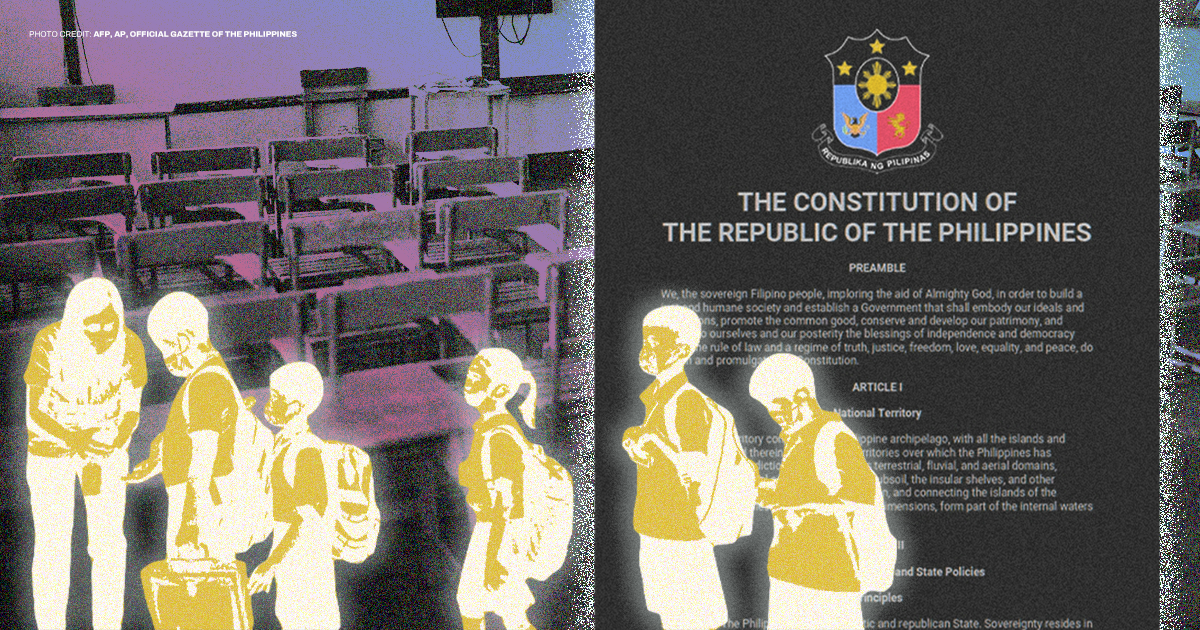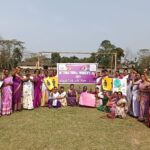The education sector in the Philippines will be opened for foreign participation and investment, whether through ownership or other forms of partnership, if lawmakers have their way.
As Congress resumes session, the House only awaits the Senate adoption of proposed amendments to the 1987 Constitution, including one on Section 4 of Article XIV (Education, Science and Technology, Arts, Culture and Sports):
“Section 4. (2) Basic educational institutions, other than those established by religious groups and mission boards, shall be owned solely by citizens of the Philippines or corporations or associations at least sixty per centum of the capital of which is owned by such citizens. The Congress, however, may require increased Filipino equity participation in all educational institutions. The control and administration of educational institutions shall be vested in the citizens of the Philippines, unless otherwise provided by law.”
By inserting the word “basic,” Congress wants the potential restriction on foreign ownership and investment in the Philippine education sector to only apply to basic education. At a stroke, higher education institutions (HEIs), including State universities and colleges, are fully opened to the entry of foreign schools or increased foreign presence either through ownership, or other forms of partnerships and engagement.
Basic education – elementary, junior high school and senior high school – in principle remains Filipino-owned and controlled but Congress is now given the legislative authority to change how much foreign ownership or participation is allowed in basic education.
Academic groups, teachers, students and DepEd itself have all voiced their opposition to such moves, especially for basic education that requires more strategic public investment, rather than relying on private foreign sources of support.
At What Cost?
The Philippine education system has been afflicted by many ills, including a worsening learning crisis in the basic education sector.
While the Marcos government clarifies that Charter change (Cha-cha) is not being offered as an overall solution, it has nevertheless been selling the idea that increasing foreign presence in the education sector will help develop the country’s human capital, aside from attracting additional investments.
Though the Department of Education (DepEd) does not absolutely prohibit the entry of foreign schools in basic education, the Constitutional restriction mandates the department to impose regulations on school building ownership, setting of tuition fees, implementation of school calendars, and curriculum requirements.
The Second Congressional Commission on Education (EDCOM 2) has pointed this out as current legal barriers to the “internationalization” of the Philippine schools.
EDCOM 2 says that the Philippines is the only Association of Southeast Asian Nations (ASEAN) member to have foreign ownership, establishment and enrolment restrictions stipulated in the Constitution. Malaysia and Singapore in contrast allow 100% foreign ownership of schools both in the basic and higher education levels.
Under DepEd guidelines, international schools are established only for foreign diplomatic personnel and their dependents or foreign temporary residents. Filipino students can be admitted in international schools, but shall not exceed more than 33% of total enrolment. There are an estimated 37 international schools in Metro Manila.
Opening schools to foreign ownership and presence might come at a great cost to educators and future generations of learners. Lawmakers admit that revising the Charter’s foreign ownership provisions is just the first step, and further easing of regulations would be needed to attract foreign investors in the sector. This is where the danger lies, as it will provide another convenient reason for the government to not provide the necessary public resources in the annual budget that the education sector deserves. It would lead to more privatization and commercialization of the local school system.
EDCOM 2 already stated that government incentives can be provided to attract prominent foreign academic institutions in the country. Singapore and Malaysia provide income tax exemptions of 100% to foreign non-profit schools and 70% tax relief for foreign private schools. And with the government keen on “catching-up” or even imitating its ASEAN neighbors, such fiscal incentives will likely also be offered to foreign investors in schools. It can also come in the form of public-private partnerships that may not require even school ownership at all, but would nonetheless involve the use of public funds to support private profits.
These government subsidies and support are critical because the education sector is not really a traditional area for foreign direct investment (FDI) to profit from. The profit that foreign capital can make from basic and higher education schools is piddling compared to investments in major sectors like manufacturing, mining or utilities. International schools also charge exorbitant fees and are thereby inaccessible for most Filipino students.
What is most likely to be replicated are education-business models such as Ayala and Pearson’s APEC schools. These schools provide “quality education” through competitive school fees. But the curriculum is designed to serve particular corporate interests for cheap, skilled labor. With the Philippines having continuous job scarcity problems, learning in school to easily land a job inside the country or abroad remains a compelling marketing pitch to Filipino students and their families.
Increasing foreign presence in education therefore essentially weakens public education, and opens more corporate influence and control over curricula and learning outcomes.
Serving Political Ends
Worse, lawmakers might even be using Cha-cha in education to achieve what they have wanted all along – political reforms (i.e., term extensions). Focusing on economic amendments to the Charter is a strategic move to avert public opposition, but nonetheless will open doors for Congress to introduce other “non-economic” amendments down the road.
Basic education, especially in the public sector, is always used as an indicator of human socio-economic development. It is also a frequent campaign issue of politicians, and a publicity-boost even for major foreign partners.
Education is among major areas that the Marcos administration actively seeks closer partnership with the US. The US government has actively supported and recommended neoliberal reforms on education, including the K-12 curriculum program. The US Agency for International Development (USAID) has invested nearly $200 million “to strengthen the capacity of Philippine education partners to drive inclusive and sustainable growth.” Last year, USAID signed a memorandum of understanding with EDCOM 2; while this year, it launched a five-year Php1.6 billion initiative to help Philippine higher education become more globally competitive.
Such partnerships are being forged even without a Constitutional amendment, but Cha-cha would provide a stronger basis for the Marcos government to increase US engagement in human capital development, in exchange for vital political support especially with the 2025 mid-term and 2028 national elections nearing.
The Hope for Nationalist Education
Marcos’ economic team aspires to make the Philippines a so-called education hub in the region. The objective is to meet international standards and make Filipino students globally competitive.
But students are not given choices nor empowered to create valuable knowledge and skills that would build a strong national economy. They are forced to focus on acquiring skills currently needed by the global labor market, as shown by the expansion of technical and vocational education.
Even the notion of developing “21st century skills” as stated in the K-12 education reform, which progressed into the present Matatag curriculum of the current DepEd leadership, is interpreted as responding to market needs. Students are being taught core competencies such as collaboration, digital literacy, critical thinking and problem-solving not for social progress but to prepare them for local and global corporate jobs. The advent of artificial intelligence and continuing emergence of “knowledge economies” entrench this particular track of learning.
Increasing foreign presence and even local corporate control would only heighten this, further pulling the country away from having a socially-progressive education system. After decades of neoliberal globalization propaganda, it is more urgent than ever for education that liberates our students and teachers from a colonial and patriarchal mindset.
Foreign-influenced curriculums will never encourage critical thinking about social issues from a nationalist perspective, foster pride about the Filipino people’s struggles and achievements against foreign powers, and teach the importance of direct democracy from the ground. The country’s educational system needs to focus on context-based learning that builds on the knowledge, skills and values needed for social and economic transformation.
Thus, education stakeholders must continue opposing Cha-cha moves and hold lawmakers to account for selling out generations of learners to an uncertain future.



